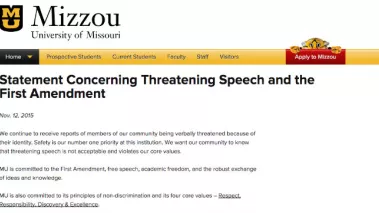Table of Contents
Mizzou Makes Big Promises, Then Waffles on Free Speech; Says Its ‘Red Light’ Speech Codes Comply with First Amendment

The University of Missouri released a statement last week detailing its plan to balance students’ safety concerns with their right to free expression. The statement comes at the end of a tumultuous few weeks in which protests over racism have roiled the campus.
Last week, university system president Tim Wolfe resigned, as did R. Bowen Loftin, chancellor of Missouri’s flagship campus in Columbia,. The associate director of the school’s Department of Student Life apologized for confronting a journalist covering a campus protest, and communications professor Melissa Click quit her “courtesy appointment” in the journalism school after being videotaped calling for “muscle” to remove a reporter from that event and appearing to grab his camera. The student filed an assault complaint with campus police. In addressing these allegations to the Columbia Missourian, Click’s boss, College of Arts and Science Dean Michael O’Brien, summed up the whole situation grimly: “This has been an awful time for the university.”
FIRE takes no position on the content of the Mizzou protests. And, as always, we encourage student protesters to exercise their right to free speech. However, the fact that some protesters and faculty called for expulsion of the free press from a public gathering, and for opposing viewpoints to be silenced in the name of providing a “safe space” for their own speech, falls short of the spirit of open discourse enshrined in the First Amendment. That’s why we were hopeful upon first look at this new statement from Mizzou administrators, as we thought it would help protect open dialogue at Mizzou.
The statement provides: “MU is committed to the First Amendment, free speech, academic freedom, and the robust exchange of ideas and knowledge.” Additionally, it states:
MU is also committed to its principles of non-discrimination and its four core values – Respect, Responsibility, Discovery & Excellence.
Nevertheless, some speech that is contrary to those values must be tolerated by a university that is open to the exchange of ideas and committed to the First Amendment.
This is a good start to Mizzou’s statement. Unfortunately, from there, Mizzou’s statement gets considerably muddier:
Some hateful and hurtful speech violates our core values, and as an institution of higher education we have a responsibility to educate our community about our core values — even if such speech is also protected by the First Amendment and is not subject to sanctions.
The statement goes on to say the following, leaving substantial First Amendment concerns:
Not every statement that is reported to the police or to the Title IX Office (573-882-3880) will result in a formal proceeding. Individuals should call 911 if they feel they are in immediate danger. Depending on the circumstances, some speech may constitute verbal conduct violating the student code of conduct or anti-discrimination rules, and may be subject to sanctions.
Mizzou’s administration leaves it unclear whether students are to report protected speech to the police, and it is threatening to investigate these reports. At FIRE, we’ve said on numerous occasions that investigations into protected speech chill campus discourse. Of course, the First Amendment does not protect unlawful true threats or harassment, and students should report them. But encouraging the reporting of protected speech goes too far.
Then, there’s this (emphasis added):
The MU Student Code of Conduct prohibits discrimination, harassment, bullying, disruptive conduct, threatening and intimidating behaviors, and physical abuse, among other conduct. MU’s anti-discrimination rules prohibit discrimination on the basis of race and other protected categories. The conduct code and anti-discrimination rules are written and applied in a manner that complies with the First Amendment. MUPD can refer matters to Student Conduct or the Equity Resolution Process, which is used to address violations of the conduct code and anti-discrimination rules.
As is clear from looking at FIRE’s comprehensive Spotlight database, which compiles information on speech codes at colleges and universities nationwide, the assertion that Mizzou’s policies comply with the First Amendment is just plain false.
Mizzou receives an overall “red light” rating (our worst speech code rating), meaning at least one of its policies clearly and substantially restricts freedom of speech on campus. Mizzou has two red light policies, including a sexual harassment policy that bans jokes and “comments about a person’s clothing [or] appearance,” and another general harassment policy that defines harassment as “unwelcome contact with an individual through electronic, verbal or written means that … demeans and/or creates a hostile environment.”
Under this vague standard, protected speech the listener subjectively finds “demeaning” could lead to punishment. This isn’t much different from the University of Missouri Police Department’s statement informing students that “hateful” or “hurtful” speech could be punished by the university, the problems with which we warned Mizzou about in a letter sent last week.
Mizzou also has several “yellow light” policies that are ambiguous to the point they can be abused or arbitrarily applied to punish protected speech. One such policy is Mizzou’s definition of bullying, which is so broad as to disallow “diminish[ing]” another person.
So while Mizzou can articulate what First Amendment guarantees they ought to be protecting on campus, they’ve got a long way to go until they’re practicing what they preach. Reforming their speech codes would be a great start.
We at FIRE will be here, ready to assist.
Recent Articles
Get the latest free speech news and analysis from FIRE.

VICTORY: Court vindicates professor investigated for parodying university’s ‘land acknowledgment’ on syllabus

Can the government ban controversial public holiday displays?

DOJ plan to target ‘domestic terrorists’ risks chilling speech
